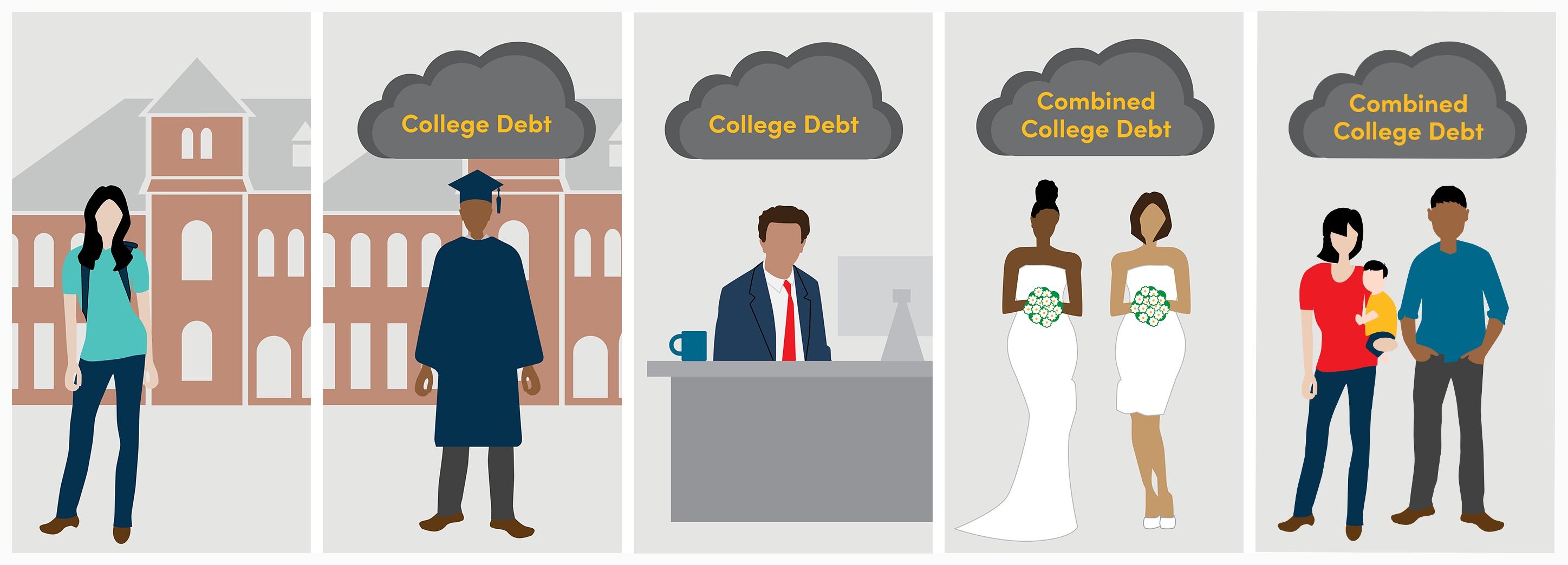

Social scientists, politicians, and others have long held that higher education has the power to overcome inequities – and to lay the foundation for everyone to achieve the American Dream.
But what happens when you are 18 and have to take out the equivalent of a home mortgage to pay for a four-year degree? Or when you begin your adult life spending up to $1,000 a month on loan payments?
Questions like these drive research by Arielle Kuperberg, associate professor of sociology and women’s, gender, and sexuality studies. Dr. Kuperberg and collaborator Dr. Joan Maya Mazelis at Rutgers University-Camden are examining how student loans affect the trajectory of our lives, with their most recent project receiving support from the National Science Foundation.
Their research is timely. Student loan debt has nearly doubled over the last decade, reaching $1.6 trillion. Of the 45 million Americans with student debt, says Kuperberg, as many as 10 million may be out of work due to the pandemic and ensuing recession. The government has paused payments on some federal loans until at least year end.
While loans play a vital role in helping 70% of students afford higher education, Kuperberg warns against unintended consequences. She has found that many, when faced with steep college loan payments, worry more about the future, delay marriage, and even put off seeking medical and dental care.
18%
of graduates with loans were delaying serious romantic relationships 15 months after graduation

25%
were delaying marriage
In one survey, one-third of respondents with student debt said they would postpone having children because of it. Kuperberg also found that, by age 35, women who graduated college with student loans were 15% less likely to have children than those who graduated without loans.
“This not only has negative effects on young people’s ability to establish themselves,” she notes, “it also could have long-term implications for society.”
A major focus of the new NSF-funded project – a longitudinal study involving approximately 6,000 surveys and over 200 detailed interviews – is social mobility. People with student loans are more likely to come from families with fewer resources, and the researchers found they are also 34% more likely to give money to their families during college.
By age 32, people with student loans and a college degree earned about $8,000 less than their debt-free counterparts.
These dynamics both reflect and perpetuate a class divide, Kuperberg says.
She hopes her research will make a difference for her children and future generations.
“Understanding these mechanisms is key to designing policy,” she says. “How do we best ensure that student loans don’t restrict social mobility and instead do what they’re supposed to do, which is help people get ahead? It shouldn’t have to be a trade-off.”

32%
of students with loans say they will put off having children
Social scientists, politicians, and others have long held that higher education has the power to overcome inequities – and to lay the foundation for everyone to achieve the American Dream.
But what happens when you are 18 and have to take out the equivalent of a home mortgage to pay for a four-year degree? Or when you begin your adult life spending up to $1,000 a month on loan payments?
Questions like these drive research by Arielle Kuperberg, associate professor of sociology and women’s, gender, and sexuality studies. Dr. Kuperberg and collaborator Dr. Joan Maya Mazelis at Rutgers University-Camden are examining how student loans affect the trajectory of our lives, with their most recent project receiving support from the National Science Foundation.
Their research is timely. Student loan debt has nearly doubled over the last decade, reaching $1.6 trillion. Of the 45 million Americans with student debt, says Kuperberg, as many as 10 million may be out of work due to the pandemic and ensuing recession. The government has paused payments on some federal loans until at least year end.
While loans play a vital role in helping 70% of students afford higher education, Kuperberg warns against unintended consequences. She has found that many, when faced with steep college loan payments, worry more about the future, delay marriage, and even put off seeking medical and dental care.
18%
of graduates with loans were delaying serious romantic relationships 15 months after graduation

25%
were delaying marriage
In one survey, one-third of respondents with student debt said they would postpone having children because of it. Kuperberg also found that, by age 35, women who graduated college with student loans were 15% less likely to have children than those who graduated without loans.
“This not only has negative effects on young people’s ability to establish themselves,” she notes, “it also could have long-term implications for society.”
A major focus of the new NSF-funded project – a longitudinal study involving approximately 6,000 surveys and over 200 detailed interviews – is social mobility. People with student loans are more likely to come from families with fewer resources, and the researchers found they are also 34% more likely to give money to their families during college.
By age 32, people with student loans and a college degree earned about $8,000 less than their debt-free counterparts.
These dynamics both reflect and perpetuate a class divide, Kuperberg says.
She hopes her research will make a difference for her children and future generations.
“Understanding these mechanisms is key to designing policy,” she says. “How do we best ensure that student loans don’t restrict social mobility and instead do what they’re supposed to do, which is help people get ahead? It shouldn’t have to be a trade-off.”

32%
of students with loans say they will put off having children